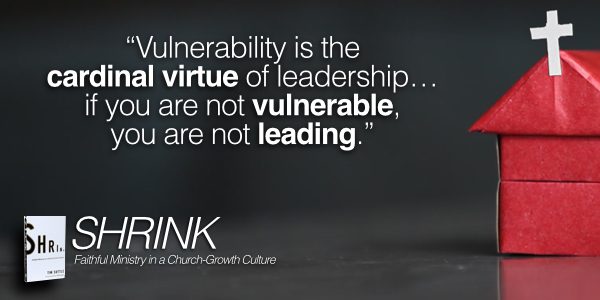 “The hardest lesson I’ve had to learn as a leader
is this: If I am not vulnerable, I am
not leading.” Shrink, p.44
“We must lead from a position of vulnerability.
“The hardest lesson I’ve had to learn as a leader
is this: If I am not vulnerable, I am
not leading.” Shrink, p.44
“We must lead from a position of vulnerability.Most people think that leadership is the exercise
of power, but it is not. Leadership that has been
informed and transformed by Christ is about
learning to embrace vulnerability, leveraging it in
ways that will inspire faithfulness in the lives of
others. – Shrink, p. 142”
One of the hardest days of my life was the day I took my oldest son to kindergarten for the first time. Two years later I did it again with my youngest, and it was just as hard. It was a long walk into that school building, it felt as if something inside me was dying. How could this be happening already? It felt like only an hour ago I was changing his diaper and teaching him to walk. Now, I’m dropping him off, with a bunch of other wide-eyed newbies, handing him over to a teacher I hardly knew…. ugh.
It was a small death, I suppose, but it still felt like death, and I felt terribly vulnerable. And yet, in that moment of death and letting go of the past, a whole new life was suddenly possible for my sons. If I would have refused, holding onto the present, I would have put my children’s lives in jeopardy. Nothing says “let it die” more than a sixth-grade boy whose dad still cuts his food for him.
When I see parents today fighting their adolescent (or worse, young adult) children’s battles for them and cleaning up their messes, something wants to say, “I get it. I know how you feel. But you have to let it go. You have to let this thing die so that your child can grow into what’s next.”
“I’m not saying that we need to find a way to become more vulnerable. I’m saying we already are vulnerable.”
The natural state of the human person is vulnerability. We are all vulnerable, and will always be vulnerable. Vulnerability is an inescapable part of the human experience. I’m not saying that we need to find a way to become more vulnerable. I’m saying we already are vulnerable. The question is how are we handling our vulnerability. Are we masking it? Numbing it? Do we power up and avoid it? Do we shrink back and hide or let ourselves be manipulated and controlled?
We are vulnerable people. Yet we will go to nearly any lengths to keep ourselves from feeling vulnerability. We don’t do vulnerability well as Americans. We do strength and victory. We do fight and scratch to the top. We do “win at any cost.” We don’t do vulnerability — it sounds too much like weakness and failure to us.
And yet: Vulnerability is the cardinal virtue of leadership. If you are not vulnerable, you are not leading. The world is full of uncertainty and risk. Leadership is about assuming that risk and daring to care and risk and work for something when there is no way to be absolutely sure it will work out in the end.
A huge temptation for leaders of any stripe is to try and run from or hide from their own vulnerability, (I have a whole chapter on this in Shrink, by the way, called “Vulerability – The Cardinal Virtue of Leadership”). We all have a choice when we are hurt, wounded, afraid, doubting, or uncertain. When we are faced with something that triggers shame, that makes us worried, that leaves us feeling vulnerable and weak, we can choose to respond with numbing, perfectionism, cer- titude, and cynicism. Or we can choose to respond with authenticity and acknowledge our own vulnerability. Christian leadership is about choosing the latter.
“Vulnerability is the cardinal virtue of leadership. If you are not vulnerable, you are not leading.”
Your goal as a leader can be to win the approval of others, to get them to like you, or to fit in. If you succeed in doing that, you will feel fine. But if you fail, you will feel shame. On the other hand, your goal can be simply to show up and tell the truth about your life, to say what you really believe, and to be your authentic self. If you succeed, you will feel fine. If you fail, you will feel disappointment, sadness, frustration, maybe even anger — but you will not feel shame.
How do you try to hide your own vulnerability? Do you numb your emotions? Do you avoid them? Do you cut off that sense of deep connection before it starts so that you don’t have to feel disappointed? Do you try to control your environment? Do you resort to perfectionism to keep from feeling the vulnerability of honest critique?
I think these four are the most common mistakes leaders make while they are trying to avoid their own vulnerability. My biggest one of these would be perfectionism, with cynicism as a close second, and honestly I can see myself falling into all four of these at different times in my life. I have to stay vigilant and fight the desire to fall into them. Which one is it for you?
- Numbing: I don’t want to feel vulnerable, so I’ll numb that feeling with a substance or experience. The problem with numbing (alcohol, drugs, porn, shopping, food…) is that you can’t selectively numb emotion. If you numb the bad emotions, you numb the good ones, too.
- Perfectionism: If I do it perfectly I can avoid the vulnerability of critique, and the exposure to the opinions of others. The problem here is that the pressure that perfectionism exerts on a leader and especially the people around them (both at work and at home), leads to burn-out, frustration, anger, and all sorts of problems.
- Certitude: Making the uncertain certain is a favorite leadership slight of hand. All of life involves uncertainty and risk. Certitude is simply a kind of self-deception. The problem is certitude almost always comes with a body count, as we slay dissenters and minority reports. A better posture is a sense of mystery, wonder, and awe.
- Cynicism: If I’m too cool to care that you don’t like what I’m doing, then you can’t hurt me, right? Wrong. Cynicism is the easy way out, the low road in any leadership situation. People don’t follow cynics. People follow leaders who dare enough to risk really caring about what they do.

















